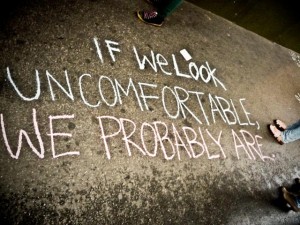Included in yesterday’s Quickies is a link addressing the internet-infamous phenomenon of the Nice Guy. The clever piece turned the narrative of the Nice Guy around and humorously expressed female frustration with the “Girlfriend Zone.” Earlier, more crude versions call it the “Fuck Zone.”
I understand that it’s meant to be a flip of the classic “Friend Zone” (or even “Ladder Theory”) narrative and a criticism of the “Nice Guy” mentality. These are all things I can certainly get behind. At the same time, I’m not certain that complaints about the single-mindedness of men, no matter how hilariously-worded and -framed said complaints might be, are the best way to criticize sexual entitlement. Not only do such notions demean men, they also belittle women who are not targeted for sexual attention.
As a single college student, I got to hear the “Nice Guys” in my life complain about how there were just no women around to date or fuck since all women led them along as “friends” (all while looking right at me, the adorably clueless jerks). To exacerbate matters, the clubs I joined, hobbies in which I engaged, social groups I helped to form, and major whose classes I most attended were all widely reputed to be, in cissexist language, “sausage-fests.” Indeed, the mention of any of those male-dominated groups in the presence of a woman or more socially-aware man often solicited a derisive snort and a warning that, as one of the few girls, I would be relentlessly pursued by desperate young men.
Confused, I watched as the few other girls in each of the aforementioned groups dealt with their particular lovesick swains while no one seemed to notice that I was also a girl. To this day, I’m more than a little confused by why things went the way that they did. All that I know is that I was not mobbed by male “friends” secretly hoping to put in just the right amount of kindness coins that would lead to sex.
In terms of harassment, women are warned by other women and well-meaning men that they should be on their guard whenever they join groups with skewed gender ratios. I was certainly so warned when it came to secular groups of all stripes, only to find myself the target of straight-up sexism rather than pick-up lines.
All this can leave women who tend not to be targeted by non-platonic male attention (positive or negative) with an odd sense of resentment. It was, for example, incredibly hard for me to be sympathetic with women complaining about how much harassment they experience when they issue universally-worded (but clearly not universally-applicable) warnings. Instead of feeling sympathy for their mistreatment, I would feel annoyed at their thoughtless overlooking of my femaleness. I had to fight the urge to think of them as somehow allied with their harassers in their shared inability to acknowledge the fact that I am also a woman.
Ditto for the exclamations of “Oh my glob, you didn’t know that [insert name here] is creepy! Ha! Duh, he’s a creeper!” All that the mocking of a woman who haven’t realized that a certain man has a reputation accomplishes is to point out that he hasn’t harassed her. There are better ways to potentially warn someone than to single them out as undesirable to someone (albeit a “creeper”). Mention that he has a reputation for lechery, perhaps, instead of declaring that he hits on all girls.
The same applies to situations where the sexual attention is wanted. I’ve been turned down by more than a few men for everything from a casual coffee date to a vacation fling. I’m sure any woman could find a man to whom she is attracted but who would reject her advances. Men should have the right to say no and be selective and women should be able to hear “no” from a man without being utterly crushed. It’s hard for a woman to not to be crushed by a “no” from a man when society informs her that men are desperate for any female attention.
Less personally and more philosophically, calling more attention to men who want sex with women who want platonic friendship, even from the point of view of the woman, reinforces the ridiculous Mars-Venus mentality. Why not attack the problem at its root by challenging patriarchal notions of entitlement to women, differentiating between entitled sexual aggression and non-threatening expressions of desire, reiterating that yes means yes and no means no, and combating the “he’s a stud, she’s a slut” thinking that makes it difficult for men to say no and women to say yes?
Ceasing the use of sweeping language with regards to women as recipients of sexual attention, wanted or unwanted, would lead to more good and less harm than discussing sexism in a way that invalidates the femininity of women who are unappealing to Nice Guys and/or harassers.






